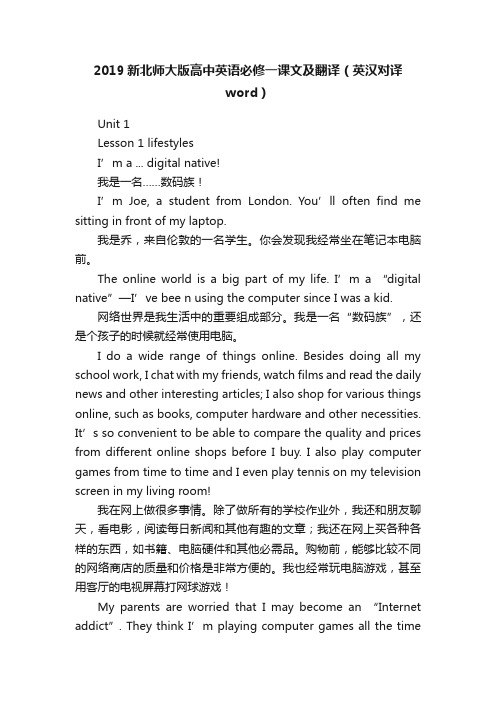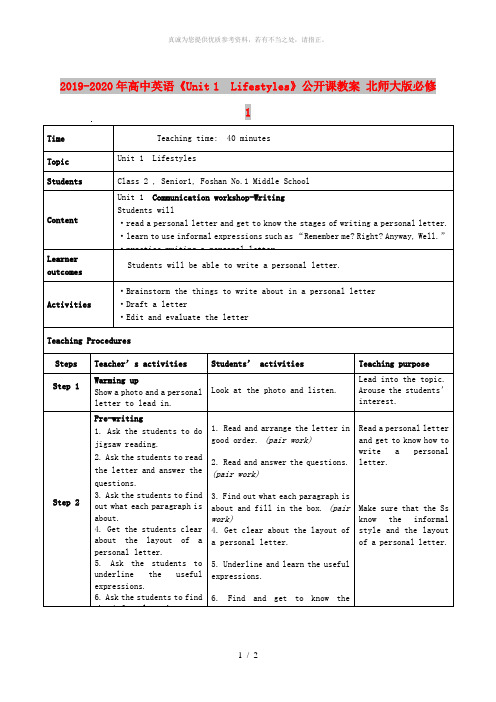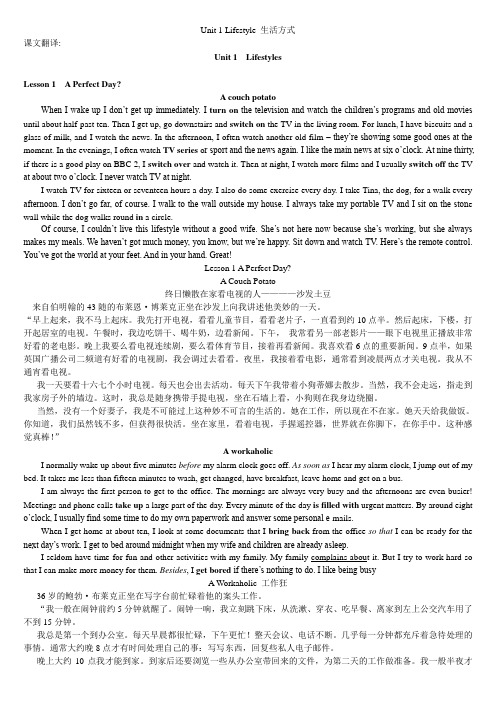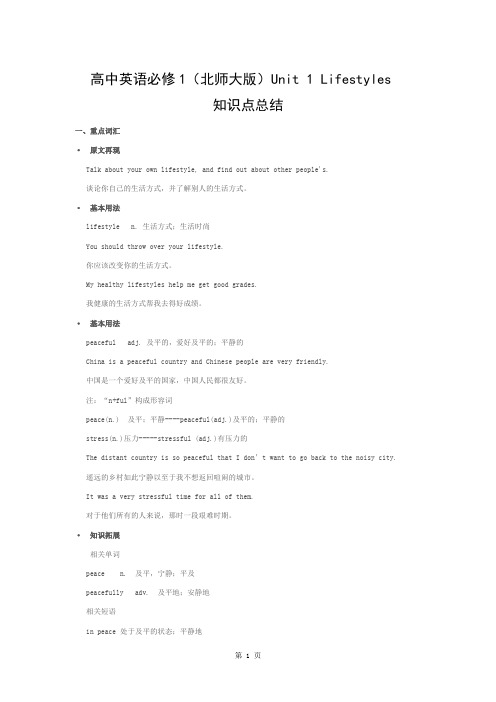2018_2019学年高中英语Unit1LifestylesSectionⅡLanguagePointsⅠWarm_up
Unit1 Lesson 1 Lifestyles词汇课件 -高中英语北师大版(2019)必修第一册

15. convenient [kənˈvi:niənt] adj. 方便的, 便利的
→ 反义词:adj. 不方便的 _i_n_c_o_n__v_e_n_i_e_n_t____ →n. 方便,便利,便利设施__co_n__v_en__ie_n_c_e_____
1)Is three o’clock convenient _f_o_r_ you?
2)我们正面临着各种各样的机遇和挑战。
_W__e__a_r_e_f_a_c_i_n_g__v_a_r_i_o_u_s_o__p_p_o_r_t_u_n__it_i_e_s_____
_a_n_d__c_h_a__ll_e_n_g_e_s_._________________________
3)He quit his previous job for various reasons.
3) Most of us like the_c_o_n_v__e_n_ie_n__c_e__(convenient)
of using credit cards
to buy necessities.
4)如果您方便的话,我计划下周五去拜访您。
__I_p__la_n__t_o__v_is_i_t_y_o_u__n__e_x_t _F_r_i_d_a_y__i_f _i_t _i_s _______
$100.
12. various [ˈveəriəs] adj. 各种各样的
→v.使不同,(使)呈现差异__v_a_r_y_____
→n. 多样化,变化;种类,品种 _v_a_ri_e_ty__
1) Just _l_ik__e__ spoken language, body language _v__a_r_ie_s__(vary) from culture to culture.
2019新北师大版高中英语必修一课文及翻译(英汉对译word)

2019新北师大版高中英语必修一课文及翻译(英汉对译word)Unit 1Lesson 1 lifestylesI’m a ... digital native!我是一名……数码族!I’m Joe, a student from London. You’ll often find me sitting in front of my laptop.我是乔,来自伦敦的一名学生。
你会发现我经常坐在笔记本电脑前。
The online world is a big part of my life. I’m a “digital native”—I’ve bee n using the computer since I was a kid.网络世界是我生活中的重要组成部分。
我是一名“数码族”,还是个孩子的时候就经常使用电脑。
I do a wide range of things online. Besides doing all my school work, I chat with my friends, watch films and read the daily news and other interesting articles; I also shop for various things online, such as books, computer hardware and other necessities. It’s so convenient to be able to compare the quality and prices from different online shops before I buy. I also play computer games from time to time and I even play tennis on my television screen in my living room!我在网上做很多事情。
2019-2020年高中英语《Unit 1 Lifestyles》公开课教案 北师大版必修1

2019-2020年高中英语《Unit 1 Lifestyles》公开课教案北师大版必修1Time Teaching time: 40 minutesTopic Unit 1 LifestylesStudents Class 2 , Senior1, Foshan No.1 Middle SchoolContent Unit 1 Communication workshop-WritingStudents will·read a personal letter and get to know the stages of writing a personal letter. ·learn to use informal expressions such as “Remember me? Right? Anyway, Well.” ·practice writing a personal letterLearneroutcomesStudents will be able to write a personal letter.Activities ·Brainstorm the things to write about in a personal letter ·Draft a letter·Edit and evaluate the letterTeaching ProceduresSteps Teacher’s activities Students’ activities Teaching purposeStep 1 Warming upShow a photo and a personalletter to lead in.Look at the photo and listen.Lead into the topic.Arouse the students’interest.Step 2 Pre-writing1. Ask the students to dojigsaw reading.2. Ask the students to readthe letter and answer thequestions.3. Ask the students to findout what each paragraph isabout.4. Get the students clearabout the layout of apersonal letter.5. Ask the students tounderline the usefulexpressions.6. Ask the students to findthe informal words.1. Read and arrange the letter ingood order. (pair work)2. Read and answer the questions.(pair work)3. Find out what each paragraph isabout and fill in the box. (pairwork)4. Get clear about the layout ofa personal letter.5. Underline and learn the usefulexpressions.6. Find and get to know theinformal words.Read a personal letterand get to know how towrite a personalletter.Make sure that the Ssknow the informalstyle and the layoutof a personal letter.Step 3 While-writing1. Ask the students todecide who to write to.2. Ask the students towrite down what they wantto know about their friendand share it with theclass.3. Ask the students towrite down what they wantto tell their friend andshare it with the class.1. Decide who to write to.2. Write down what they want toknow about their friend and shareit with the class.3. Write down what they want totell their friend and share itwith the class.4. Write a personal letter.Train the student’swriting abilities andput what they’velearned into use.Step 4 Post-writing1. Ask the students torevise their own letters.2 Ask the students to dopeer editing.1. Revise their own letters.2. Do peer editing Achieve the goal.Step 5 PresentationAsk some volunteers toshare their letters withthe class.Share the letters or listen toothers.Home work Assigning homeworkPlease polish your lettersand send them to yourfriends.Polish the letters and send themto the friends.。
北师大版高一英语Unit-1-Lifestyle-生活方式课文详解

Unit 1 Lifestyle 生活方式课文翻译:Unit 1 LifestylesLesson 1 A Perfect Day?A couch potatoWhen I wake up I don’t get up immediately. I turn on the television and watch the children’s programs and old movies until about half-past ten. Then I get up, go downstairs and switch on the TV in the living room. For lunch, I have biscuits and a glass of milk, and I watch the news. In the afternoon, I often watch another old film –they’re showing some good ones at the moment. In the evenings, I often watch TV series o r sport and the news again. I like the main news at six o’clock. At nine thirty, if there is a good play on BBC 2, I switch over and watch it. Then at night, I watch more films and I usually switch off the TV at about two o’clock. I never watch TV at night.I watch TV for sixteen or seventeen hours a day. I also do some exercise every day. I take Tina, the dog, for a walk every afternoon. I don’t go far, of course. I walk to the wall outside my house. I always take my portable TV and I sit on the ston e wall while the dog walks round in a circle.Of course, I couldn’t live this lifestyle without a good wife. She’s not here now because she’s working, but she always makes my meals. We haven’t got much money, you know, but we’re happy. Sit down and watch TV. Here’s the remote control. You’ve got the world at your feet. And in your hand. Great!Lesson 1 A Perfect Day?A Couch Potato终日懒散在家看电视的人————沙发土豆来自伯明翰的43随的布莱恩·博莱克正坐在沙发上向我讲述他美妙的一天。
高中英语北师大版必修一Unit1lifestyles教学设计

Unit1 lifestyleLesson1A Perfect DayT eaching content: reading text A couch potato. A workaholicTeaching goals:1:grasp the new words and pharses2:learn about the two different kinds of lifestyles: a couch potates and a workaholic3:practise the ss’ reading, listening and speaking ability4:help the ss develop a healthy and active lifestyleTeaching important points:1:read and understand the text2:talk about people’s different lifestylesTeaching difficult points:1;learn and grasp the new words and pharses2:communicate with each other about lifestylesTeaching measures:Pairwork, scanning, reading, listening, speaking,discussingTeaching aids:A recorder, a blackboard, a sliderTeaching procedure:Step 1 reviewingT: Hello, class! Do yo u still remember the different lifestyles we have learned? Let’s list them togther,O.K?(boring, busy, dangerous, active ,easy, lazy, stressful…)T: Well done!Step 2 lead-inT: Look at the two pictures, What kind of lifestyles do they have?(Mr.Blakey is lazy , Mr. Black is busy and stressful.).What’s Mr.Blakey doing? Do you like watching TV? What are your favourite kinds of TV programmes? Do you ever watch too much TV? How much time do you spend watching TV every day?Step 3 scanningT: Today , We’ll learn about two men. They live in different lifestyles.Read the two textssome personal e-mails 4:read documents at home)Step 4 readingT: Quite good. Now read the text again. Underline the new words and phrases, then answer the questions in Ex.4(Suggested answers: No.1: Brian do nothing but watch TV for 16-17hours and his wife makes money and prepares meals for him. No2: You know everything happening in the world and feel powerful and successful)Step 5 language learning1: switch on : turn onSwitch the TV on quickly, the game will be on TV soon2: switch off: turn offBefore leaving, you should switch the tap off.3:switch over: change the channels from one to another.The programme OUTLOOK is on TV. Let’s switch it over to Chaanel 9.4:be filled with; be full of5:take up: cover,occupy Playing football takes up most of his time6:get changed; change one’s clothes7:make one’s way through:do sth.. from the beginning to the endI have been sitting , making my way through my lesson for hoursT: Let’s do Ex.7complete the sentence below in the correct form . After that we’ll play the tape for you to listen and then I’ll get some ss to read the text alou d.Step 6: consolidationT: We’ve learned Mr. Blakey and Mr. Black’s routine work. Do you think if their lifestyles are healthy? What can they do to improve their lifestyles? Discuss and then share your opinions with class.(For Brain he should spend less time on TV. First , he should get up soon after waking up and do morning exercises. Second ,he should try to find a job and go to work every day.. For Bob , he should sleep later every morning. He should eat a big breakfast and be more relaxed. He should also sleep earlier every night, and spend more time with his family. )T: Well, let’s go on to another topic . Ask your partner what he or she do at different time in a day, and decide wheather your partner is a couch potato or a workaholic? Use the following samples: What do you do at …?Step 7 homework1:Review new words and phrases2:Do the Ex. 10 describe your parents’ lifestyles to your partner by working in pairs Blackboard DesignLesson 1 A Perfect Day?1: switch on : turn on 2: switch off: turn off3:switch over: change the channels from one to another.4:be filled with; be full of 5:take up: cover,occupy6:get changed; change one’s clothes7:make one’s way through: do sth.. from the beginning to the endLesson 2 RelaxingTeaching aims:To practise listening for specific informationTo learn about ways of dealing with stress in everyday lifeTeaching course:Ⅰ Warm upWork is very important in our life. We have to work, no matter what you are. With the development of modern society, people are fastening their steps of life. There is less time for relaxation. The problem is that more and more people feel stressed. How to get rid of the stress we are suffering from is what we are to talk about.Ⅱ TalkingTask oneYou are to do some listening, Before it think about your school life, list the things ( at least 3 ) you do and your feeling about them.How do you get rid of the stress in your life?Talk to each other about the activities you have listed. Say which is stressful and which is relaxing. Do it like this:prepare for an exam; lie on the beach; wait for the result of; give a talk in English; do shopping with task two.Interview your classmates to see what kind of stress they are suffering from and how they relax themselves or get rid of it.ⅢListeningDo the exercise 2Do the exercise 3Read through the Strategies with the class and see if they can use any of these Strategies already. In pairs, students read the questions and try to predict the answers. Point out that morethan one answer is possible.Students then exchange ideas to find out if they have made the same predictions if they have made different predictions, ask students to justify their opinions.Do the exercise 5 and 6Before listening the materials ask students to read the questions and first predict answers then listen the tape twice.When students have checked their answers, ask them what advice they would give to Mark to help him be less nervous before exams and before going to parties.Do the exercise 7Students look at the exercise and see if they can remember or can guess any of the missing words. Students listen to the cassette again and complete the sentences in the Function File. PronunciationDo the exercise 9In our oral language we often pause. Now listen to Mark again. Which words or sounds does he use to hesitate?Students listen to the cassette. After each sentence, pause the cassette so that students can repeat the hesitation device.Do the exercise 10Before starting their talk, students can look at the sentences they wrote in Exercise 9Students then put the exercise away and talk to their group without any notes, using as many hesitation words as possible.Ⅳ Homework:Writ a report about you interview in class. Write about the stress you and most of your classmates are suffering from. Find the causes of the stresses and give advice on how to relax yourselves.Lesson 3 A Volunteer TeacherTeaching aims:To listen for specific factsTo give opinion about voluntary workTo talk about future arrangements and intentions, using the Present Simple, the Present Continuous and going toTeaching difficulties:To talk about future arrangements and intentions, using the Present Simple, the Present Continuous and going toTeaching Aids: computer and cassetteTeaching procedures:Ⅰ. SpeakingT: What does the girl do?S:T: Yes she is a volunteer teacher. T his is a real story. The girl’s name is Wang Shu, grew up in Hangzhou, Zhejiang Province. Upon graduation from the English department of Beijing Normal University, she left Beijing for Inner Mongolia working as a volunteer teacher. She is still there now. What do you know about this part of China?S:T: show a slide to introduce Inner Mongolia (Inner Mongolia (Nei Mongol) is the first national autonomous region established in China. It stretches along China's northern border with Mongolia and Russia and covers an oblong area of over 1.28 million square kilometers, one eighth of China. Of all the Chinese provinces and autonomous regions, Inner Mongolia is the third largest after Xinjiang and Tibet.) Inner Mongolia falls behind developed areas so it needs volunteers go to work there.T: What can you say about the girl in the photo?S:Ⅱ ListeningStudents read the questions and predict the answersT: I think you must be interested in Wang Shu, now listen to the interview, you will learn more about her and answer these questions.Students listen to the tape and check their predictions.Students listen to the tape again and make sure of the answersStudents work in pairs and take turns to retell Wang Shu’s storyⅢ Voice your opinionIs it a good idea to do voluntary work? What reasons do people have for doing voluntary work?Ⅳ VocabularyDo the exercise 5.Students work individually, thinking about the cues and what they are going to do.Students read the sentences, decide which words to use, and then complete the sentences. Translate sentences1.我们要两点半出发。
高中英语必修1北师大版Unit1Lifestyles知识点总结

高中英语必修1(北师大版)Unit 1 Lifestyles知识点总结一、重点词汇·原文再现Talk about your own lifestyle, and find out about other people's.谈论你自己的生活方式,并了解别人的生活方式。
·基本用法lifestyle n. 生活方式;生活时尚You should throw over your lifestyle.你应该改变你的生活方式。
My healthy lifestyles help me get good grades.我健康的生活方式帮我去得好成绩。
·基本用法peaceful adj. 及平的,爱好及平的;平静的China is a peaceful country and Chinese people are very friendly.中国是一个爱好及平的国家,中国人民都很友好。
注:“n+ful”构成形容词peace(n.) 及平;平静----peaceful(adj.)及平的;平静的stress(n.)压力-----stressful (adj.)有压力的The distant country is so peaceful that I don’t want to go back to the noisy city.遥远的乡村如此宁静以至于我不想返回喧闹的城市。
It was a very stressful time for all of them.对于他们所有的人来说,那时一段艰难时期。
·知识拓展相关单词peace n. 及平,宁静;平及peacefully adv. 及平地;安静地相关短语in peace 处于及平的状态;平静地He can't live in peace with his neighbors.他不能及他的邻居及平共处。
·基本用法stressful adj. 紧张的;有压力的It was a very stressful time for all of them.对于他们所有的人来说,那时一段艰难时期。
2019北师大版高中英语必修一Unit1Lesson1Lifestyles-Reading课件

I am Joe, a student from London. My parents often find me 1. _s_i_tt_in__g____ (sit) in front of my laptop.They are worried that I may become 2._a_n__ “Internet addict”. They think I am playing computer games all the time and I chat too much 3. _w_i_th__ online friends. According to them, there is a 4. _d_a_n_g_e_r___(dangerous) that I may not be ablteo5t.e_ll_________ (tellw) 6h.e_th_e_r_____these friends are real friends.
determined to be successful, and able to deal
with new or difficult situations easily!
B. I’m aቤተ መጻሕፍቲ ባይዱgo-getter!
I’m Li Ying. I like to set goals for myself. I’m a “go-getter” — when I set out to do something, I do my best to achieve it.
play computer games
go running
InInyoyuorufrrfereetitmime,ew, whhaattaacctitviviittiieessddooyyoouu eennjoy?
2019_2020学年高中英语Unit1LifestylesPeriodTwo练习(含解析)北师大版必修1

PeriodTwo Warm-up&Lesson1 APerfectDay?—LanguagePointsⅠ.写出下列单词的汉语意思(共10小题;每小题1.5分,满分15分)1.lifestyle n.生活方式2.shepherd n.牧羊人3.series n.系列节目;系列4.cartoon n.卡通片,动画片plain vi.抱怨;投诉6.couch n.长沙发,睡椅7.portable adj.轻便的,手提(式)的8.workaholic n.工作狂9.paperwork n.日常文书工作10.midnight n.午夜,半夜Ⅱ.写出下列汉语对应的英语单词(共10小题;每小题2分,满分20分)11.peaceful adj.平静的;和平的→peace n.和平→peacefully adv.平静地12.relaxing adj.轻松的,放松的→relax vt.&vi.放松→relaxed adj.感到松懈的;感到放松的13.stressful adj.充满压力的,紧张的→stress n.压力vt.强调14.suppose vt.认为,猜想15.switch vt.转换,转变16.remote adj.遥远的17.alarm n.警报,警告器18.urgent adj.急迫的,紧急的→urge v.催促;力劝n.冲动19.document n.公文,文件20.bored adj.厌烦的,不感兴趣的→boring adj.令人厌烦的;无聊的Ⅲ.写出下列短语或短语对应的汉语意思(共10小题;每小题3分,满分30分)21.switchon把……打开,接通22.switchover转换频道,转变23.switchoff把……关掉,关上24.gooff(铃、爆竹等)响25.takeup占据26.get changed换衣服27.befilledwith充满着28.bringback带回;归还;回忆起plainabout抱怨30.getbored感到厌烦Ⅳ.完成句子(共5小题;每小题7分,满分35分)31.What kind of lifestyle doyouthink the people have?你认为这些人拥有什么类型的生活方式?32.I always take my portable TV and I sit on the stone wall while the dog walks round in a circle.我总是随身携带手提电视,坐在石墙上看,而小狗则在我身边绕圈。
- 1、下载文档前请自行甄别文档内容的完整性,平台不提供额外的编辑、内容补充、找答案等附加服务。
- 2、"仅部分预览"的文档,不可在线预览部分如存在完整性等问题,可反馈申请退款(可完整预览的文档不适用该条件!)。
- 3、如文档侵犯您的权益,请联系客服反馈,我们会尽快为您处理(人工客服工作时间:9:00-18:30)。
Section ⅡLanguage Points (Ⅰ) (Warmup & Lesson 1)[语言基础自测]Ⅰ.单词拼写根据汉语或首字母提示,写出下列单词1.Don't respond to any email requesting personal(私人的,个人的) information,no matter how official they look.2.People are always complaining(抱怨) about the constantly rising prices. 3.Don't switch(转换) over the channel.The programme is attractive.4.All the people in the world hope to live a peaceful(和平的) life.5.The folk music made me feel relaxed(放松的).6.Pleasant Goat and Big Big Wolf is a favourite cartoon TV series.7.All countries are supposed to support one another.8.Many people complain that their jobs are uninteresting and stressful. 9.The children in that area are in urgent need of medical care.10.I want you to be home before midnight.Ⅱ.拓展词汇根据词性或汉语提示,写出下列单词1.peace n.和平;安静→peaceful adj.平静的;和平的2.relax vt.放松→relaxing adj.放松的;轻松的→relaxed adj.感到放松的→relaxation n.放松3.stress n.压力;强调;重音vt.强调;重读→stressful adj.充满压力的,紧张的4.urgent adj.急迫的→urgency n.紧急情况5.bore vt.使厌烦→boring adj.令人厌烦的→bored adj.厌烦的[寻规律、巧记忆]根据提示补全下列短语1.switch on 把开关打开,接通2.wake up 醒来3.take up 占据4.be filled with 充满着5.as long as 只要6.complain about 抱怨7.go off (铃、爆竹等)响8.bring back 带回Ⅳ.选词填空用上述短语的适当形式填空1.My room is filled with the sweet of roses.2.The firecracker went off and scared Jack's dog.3.He asked me to switch on the radio for him.4.As long as you drive carefully,you will be very safe. 5.This table takes up too much room.[寻规律、巧记忆]Ⅴ.经典句式仿写[核 心 要点 探 究]relaxing adj.轻松的,放松的(教材P 7)I think a shepherd's life is peaceful and relaxing —but maybe it's boring sometimes.我认为牧羊人的生活是宁静的、轻松的——不过可能有的时候令人厌烦。
我真的很喜欢听音乐,因为它有助于我放松。
②Take a deep breath,and you will feel relaxed(relax). 深深地吸一口气,那样你会觉得轻松的。
[名师点津]relaxed 常用来修饰人,指“(人)感到放松、轻松”;relaxing常用来修饰事物,指“(某事或某物)令人感到放松、轻松”。
switch v .转换,转变(教材P 8)Then I get up ,go downstairs and switch on the TV in the living room. 接着我起床,下楼,打开起居室的电视。
我们换个频道好吗?②Switch on the computer ,please.I want to play computer games.请打开电脑,我想玩电脑游戏。
③Don't forget to switch off all the lights before leaving the office.离开办公室前别忘记关掉所有的灯。
(教材P8)I always take my portable TV and I sit on the stone wall while the dog walks round in a circle.我总是随身携带着手提电视,坐在石墙上,小狗则在我身旁绕圈。
【要点提炼】while此处作并列连词,意为“而,却”,表示对比关系。
while也可作从属连词,引导时间或让步状语从句,意为“当……时候”或“尽管……”等。
①Some are rich,while others are poor.有些人很有钱,有些人却很穷。
②He fell asleep while he was doing his homework.他做功课时睡着了。
③While online shopping has changed our life,not all of its effects have been positive.尽管网上购物已经改变了我们的生活,但并非它的所有影响都是积极正面的。
[明辨异同] while/when/as④When/While/As I was walking down the street,I noticed a police car in front of the store.⑤When John arrived,I was cooking lunch.⑥I was wandering through the street when I caught sight of a tailor's shop.go off(铃、爆竹等)响;离开;爆炸;进展;停止工作;(食物)变坏等(教材P9)I normally wake up about five minutes before my alarm clock goes off. 我一般在闹钟响前5分钟就醒了。
写出下列句子中go off的汉语意思①The car alarm went off as a thief was trying to steal the car.响起②We don't have a fridge and the milk goes off within a day in hot weather.变质③Everyt hing went off according to our plan.进展,进行去吧,喜欢干什么就干什么。
⑤Don't let the fire go out;there's plenty of wood.不要让火灭了,有的是木柴。
⑥P assenger traffic has gone up by 20 percent.客流量已增长百分之二十。
(教材P9)It takes me less than fifteen minutes to wash,get changed,have breakfast,leave home and get on a bus.我用不足15分钟的时间洗漱、穿衣、吃早饭、离开家并坐上公共汽车。
【要点提炼】“It takes sb.some time/money to do sth.”这一句型表示“做某事花费了某人多少时间/金钱”,此句型中的it是形式主语,真正的主语是后面的动词不定式;动词take在本句型中意为“花费”。
此句型也可理解为:To do sth.takes sb.some time/money.。
①The work will take us two weeks to finish.这项工作需要花我们两周时间来完成。
②It takes me half an hour to go(go) to school.我需要花半个小时到学校。
[明辨异同] take/pay/spend/cost用take,pay,spend,cost的适当形式填空③ I pay 10 yuan for books on computer each month.④ It took me two hours to finish the work yesterday.⑤How much would it cost us to replace?⑥More money should be spent on education.take up占据(时间、空间等);开始从事;拿起;继续;对……产生兴趣(教材P9)Meetings and phone calls take up a large part of the day.整天会议、电话不断。
写出下列句子中take up的汉语意思①She took up the receiver and began to dial the number.拿起②When did you take up Japanese as a second foreign language? 开始从事③For example,playing football and watching TV take up much of my spare time.占据(时间)④I took up acting while I was at college.对…… 产生兴趣⑤The band's new album takes up where their last one left off.继续⑥I managed to rent a big enough house to take in a handful of people.我设法租了一个足够大的房子,可以容纳许多人。
⑦China has taken on a new look since new economy policies were carried out. 自从新的经济政策被执行以来中国已经呈现出一派新面貌。
